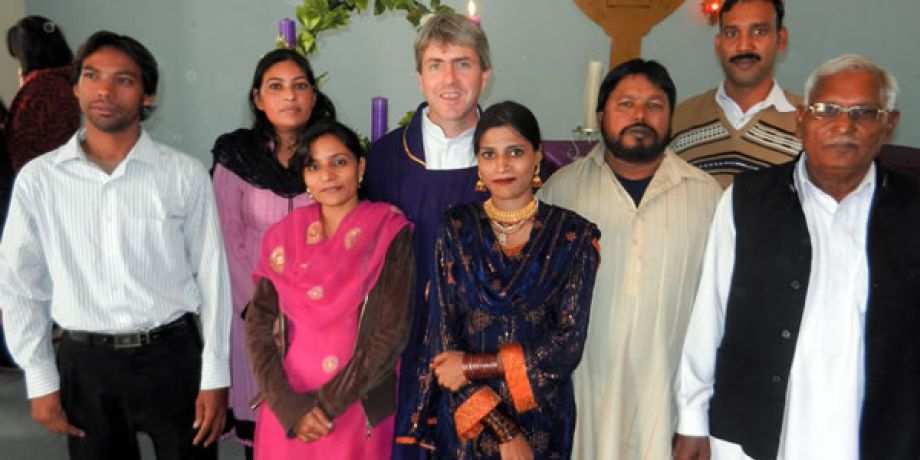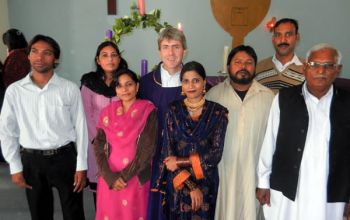
Pakistani Lay Men, Women and Families on Mission
Columban missionary Fr. Tanvir O’Hanlon invited me to work with the Columbans for the promotion of mission in our local church. He said to me, “We have this gift of mission and we want to give it to the people of Pakistan.” That was in 2007 when I had recently completed a four year contract in a pastoral institute dedicated to the formation of religion teachers. However, the story of my faith journey began about 30 years ago when I was in my early twenties.
For two years I trained to be a catechist and then the De La Salle Brothers decided to send me to the Urbaniana University in Rome for further studies. After two years of study I graduated with a licentiate in missiology. One of my favorite authors at the time was Cardinal Carlo Maria Martini, and I had the good fortune to spend a three month summer break in his Milan diocesan lay missionary center for Africa. I took part in the program for the lay missionaries and was deeply impressed on seeing whole families preparing to go on mission.
Cardinal Martini visited occasionally and even though he did not say much, his presence was the message that stayed with me. I liked the way he commented on the Bible; it was as if he did not merely have the mind of the Church but the Church was in him. He would say, “You are not merely in the Church but the Church is in you.” Cardinal Martini and what I experienced at that center for mission became the main sources of my inspiration for subsequent work with laity.
On my return from Rome I took up a teaching post at the national catechists’ training center in Faisalabad. The center was run by the De La Salle Brothers for all the dioceses of Pakistan. My life there was one of books, classes, correcting assignments and so on – all that goes with a teaching job in an academic institution. I was happy in my work and in my home life, but then in 1996, ten years after I had begun teaching, tragedy struck. My wife, who was only 28 years of age, died. We had three children, the eldest a boy (8 years), then a girl (6 years) and a boy (4 years).
I stopped teaching and did nothing for six months. I grieved and wondered how this fit into God’s plan for me. I felt so broken up and did not understand what God wanted of me. I did not know where my life was headed, and I could not simply return to teaching in the institute for catechists. Then a priest friend, Fr. Emmanuel Asi, opened a door for me, and I walked through it into a new life. He invited me to coordinate a newly established theological institute for laity – MAKTABA-E-ANAVEEM (School of Thought of the Poor). The name is in Urdu, our common language in Pakistan. The root of the first word is Arabic and the second is Hebrew.
The new institute’s work was not done primarily in the classroom. My job put me in direct contact with lay men, women and children in the grassroots of our local church. We promoted the formation of theological groups in every city of the country, forming the groups with the help of parish priests and catechists. I realized that this work with laity was God’s will for me. There was so much opportunity for further study for clergy and religious, but lay men and women were not valued for the work of doing theology. In fact, some priests opposed our work and said that theology was not a suitable topic for the laity, but other priests supported us.
My brokenness prepared me to go with people, to be with them in a common search for our way in life. I reflected anew and my reflection was fresh. As I got into the job I came to appreciate the fertility of my pain.
Our priority was fostering the life of Christian communities, forming laity for mission, and developing a network among the theology groups we formed. I was doing all this under the directorship of Fr. Asi but when he moved on and another person took over he destroyed what we were doing. The church leadership became concerned and our nascent movement of lay theology became dormant. However, there is still a spark there, but it needs someone to breathe air on it. It seems to me the church leaders want the institution of the Church to be a priority in itself. In contrast, we focused on the everyday lives of ordinary lay people. What does the Word of God have to say to what we are living? What is God calling us to in our daily lives? How might we build a more harmonious, inclusive and just society?

We worked to give birth to a local contextual theology. Our basic inspiration was the opening lines of Vatican II’s great document, “Pastoral Constitution on the Church in the Modern World” (Gaudium et Spes), Promulgated by Pope Paul VI, December 7, 1965: “The joys and the hopes, the griefs and the anxieties of the men of this age, especially those who are poor or in any way afflicted, these are the joys and hopes, the griefs and anxieties of the followers of Christ.” I believe that the mystery of mission is hidden in the words, “the joys and the hopes, the griefs and the anxieties of the men [and women] of this age, especially those who are poor or in any way afflicted.”
I was totally changed by the task I had taken on. I was no longer preparing and teaching class but rather reflecting and sharing my faith with other lay men and women. I learned to express myself in the language of everyday life, to listen carefully to the reflections of others and I soon discovered the marvellous mystical depth in so many of the people with whom I was working to build up our network of contextual theology. In fact, I began to realize my potential as I moved more and more into dialogue rather than being the one who knew and explained things to others. We had moved beyond catechetics, the task of communicating the essentials of our Christian faith, to theologizing, the task of reflecting creatively on the implications of the Word of God for our lives and for our planet earth on and with which we give shape to our lives.
Many lay members of the network were diocesan catechists who rely on the diocesan salary to support their families. Consequently the network we created could not prosper without the support of church leaders. When the catechists have a national meeting I still sometimes receive an invitation to speak, and I like to go as I know so many of them; they were my students and later, collaborators in creating something new among the laity in our local church. Some may have seen my going from one institution to another as failure, but I feel that I have lived my calling in a missionary way. I never became installed. I resigned from Maktaba-e- Anaveem and moved to a pastoral institute run by the Dominican Fathers to work on the formation of religious teachers, so I was again busy with the formation of the laity.
And so I come to the fourth stage of my missionary adventure, for now with the Columban missionaries. I had come to understand that we do not necessarily see the fruits of our mission, but rather our calling is to die as a seed of mission. We can easily become over absorbed with tangible and verifiable evidence of success. With this in mind, I began to collaborate with Fr. Tanvir in a mission exchange program, in which one parish community in Lahore sent missionaries to another community in Sindh and the parish in Sindh reciprocated. We had sown the seed of this exchange in Bible study groups that we run every evening in various parish centers. In our culture we are considered “People of the Book,” so we readily discern the will or call of God in our reflection on Bible texts. Once we have chosen those we wish to send we give them an intensive preparation before they go on their two to three week missionary journey.
On arrival at their destination our missionaries are welcomed into the homes of the families with whom they will stay. Over the course of their time on mission they share their faith story with their hosts, be it with the family where they are staying or with a parish community. For all missionaries this is a cross cultural experience even though all participating in the program are Pakistanis. On returning to home base our missionaries share with their friends how the experience has changed them. Sometime later missionaries from a Sindh parish community came to Lahore to enjoy our hospitality and share their faith stories with us. In both cases, on the day of departure the missionary group is given a public send-off at the end of Mass in the presence of the whole community so they have a sense of being sent by the community, not just by the priest.
It is a great experience for both sides when grassroots parishioners can recognize and say, “We are missionary.” They had thought that only the foreigner is missionary. As we locals own that same calling, we change our awareness of who we are as Christians.